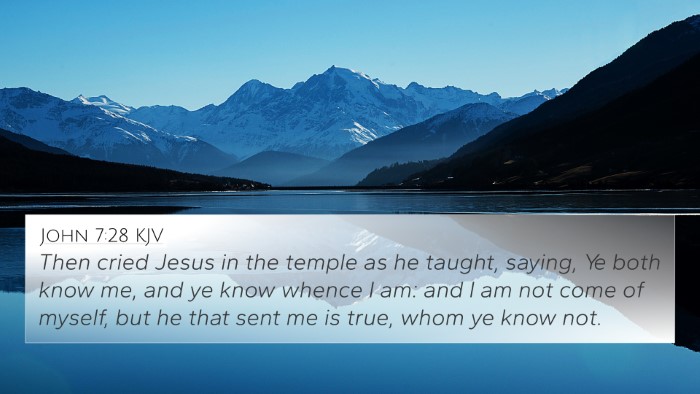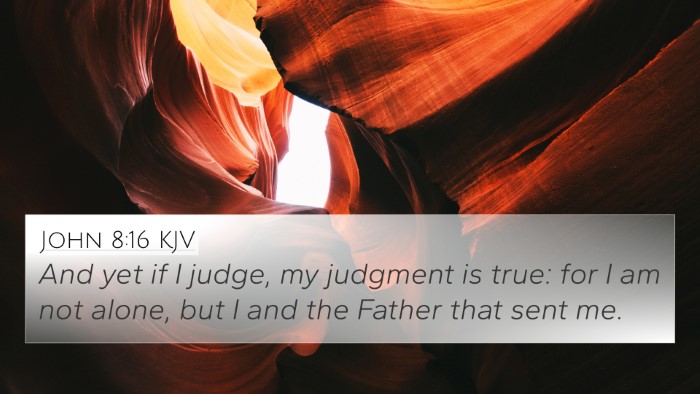Understanding John 8:26
John 8:26 states: "I have many things to say and to judge of you: but he that sent me is true; and I speak to the world those things which I have heard of him." This verse is a profound assertion of Jesus' divine mission and authority, emphasizing both the truth He conveys and the source of that truth.
Verse Summary
In this verse, Jesus speaks to the Pharisees and expresses the complexity of His spiritual mission. He acknowledges the multitude of things He needs to communicate, both in teaching and judgment. By stating 'he that sent me is true,' He affirms the reliability of His message, which is derived directly from God.
Insights from Commentaries
Matthew Henry's Commentary
Matthew Henry elaborates on how Jesus' statement indicates that His words come from God, carrying a divine authority. He draws attention to the importance of recognizing the truthfulness of Jesus's message, which stands in contrast to human opinions. Henry also notes the gravity of Jesus' judgment, hinting at a time of reckoning for His audience.
Albert Barnes' Commentary
Albert Barnes emphasizes the dual role of Jesus as both a teacher and a judge. He points out that while Jesus has much to reveal about human nature and sin, His focus remains on what has been entrusted to Him by the Father. Barnes also discusses the implication of Jesus’ authority to judge, reminding the readers to heed His words with seriousness.
Adam Clarke's Commentary
Adam Clarke discusses the significance of "the things which I have heard of him," suggesting that Jesus’ teachings are not arbitrary but hold genuine weight as they stem from divine revelation. Clarke highlights the unchanging nature of this truth through times and contexts, reinforcing the idea that Jesus’ declarations are eternally valid and relevant.
Bible Cross-References
The following Bible verses relate closely to John 8:26:
- John 7:16 - "Jesus answered them, and said, My doctrine is not mine, but his that sent me."
- John 12:49 - "For I have not spoken of myself; but the Father which sent me, he gave me a commandment, what I should say, and what I should speak."
- John 14:24 - "He that loveth me not keepeth not my sayings: and the word which ye hear is not mine, but the Father's which sent me."
- Matthew 28:18 - "And Jesus came and spake unto them, saying, All power is given unto me in heaven and in earth."
- John 6:38 - "For I came down from heaven, not to do mine own will, but the will of him that sent me."
- John 5:30 - "I can of mine own self do nothing: as I hear, I judge: and my judgment is just; because I seek not mine own will, but the will of the Father which hath sent me."
- John 10:30 - "I and my Father are one." (This speaks to the unity and agreement in their mission.)
Connections Between Bible Verses
John 8:26 is deeply interconnected with various themes across the Gospels. The emphasis on divine authority highlights the consistent message throughout scripture regarding Christ's purpose and the sovereignty of God. Below are thematic connections:
- The Authority of Christ: Multiple passages establish Christ's divine authority, illustrating how His words and actions stem from direct communication with God.
- The Nature of Truth: Jesus frequently discusses the concept of truth and its origins, which can be explored through His declarations in John 14:6, where He claims, "I am the way, the truth, and the life."
- Judgment and Teaching: The dual role of Jesus as judge is reinforced in several passages, urging a deeper exploration of His teachings in light of the impending judgment.
- Divine Wisdom: The wisdom imparted by Jesus reflects the same wisdom found in Proverbs, bridging the Old Testament teachings with the New Testament revelations.
Using Bible Cross-References
Studying Bible cross-references, such as those linked to John 8:26, enhances our understanding of scripture. It provides the reader with a framework to explore the connections and themes that run through the Bible, allowing for a richer, more comprehensive study.
Tools for Bible cross-referencing, such as a Bible concordance, offer insight into related passages and themes. Here are some methods to effectively utilize cross-references:
- Identify Themes: Focus on the central themes in John 8:26 and seek other verses discussing similar subjects.
- Comparative Studies: Perform comparative Bible verse analysis to see how different writers present similar messages.
- Contextual Understanding: Look at verses surrounding John 8:26 to gain context, allowing a deeper understanding of Jesus' declarations within the narrative.
- Inter-Biblical Dialogue: Explore how New Testament verses reflect Old Testament themes, enriching the reader's theological knowledge.
Conclusion
John 8:26 serves not only as a statement of Jesus’ authoritative voice but also as a cornerstone for understanding His mission and the context of His teachings. By examining related verses and themes, believers can connect deeply with scripture, embracing the rich tapestry of the Biblical narrative.
Further Study Suggestions
Engaging with the process of cross-referencing enhances not only personal study but can also inform sermon preparation and teaching settings. Utilizing a comprehensive Bible cross-reference guide can significantly aid in identifying connections between verses more effectively.
Relevant Bible Cross-References for Further Inquiry
- Romans 10:17 - "So then faith cometh by hearing, and hearing by the word of God." (Indicates the importance of the spoken Word.)
- 1 Corinthians 1:21 - "For after that in the wisdom of God the world by wisdom knew not God, it pleased God by the foolishness of preaching to save them that believe."
- Hebrews 1:1-2 - "God, who at sundry times and in divers manners spake in time past unto the fathers by the prophets, hath in these last days spoken unto us by his Son."















